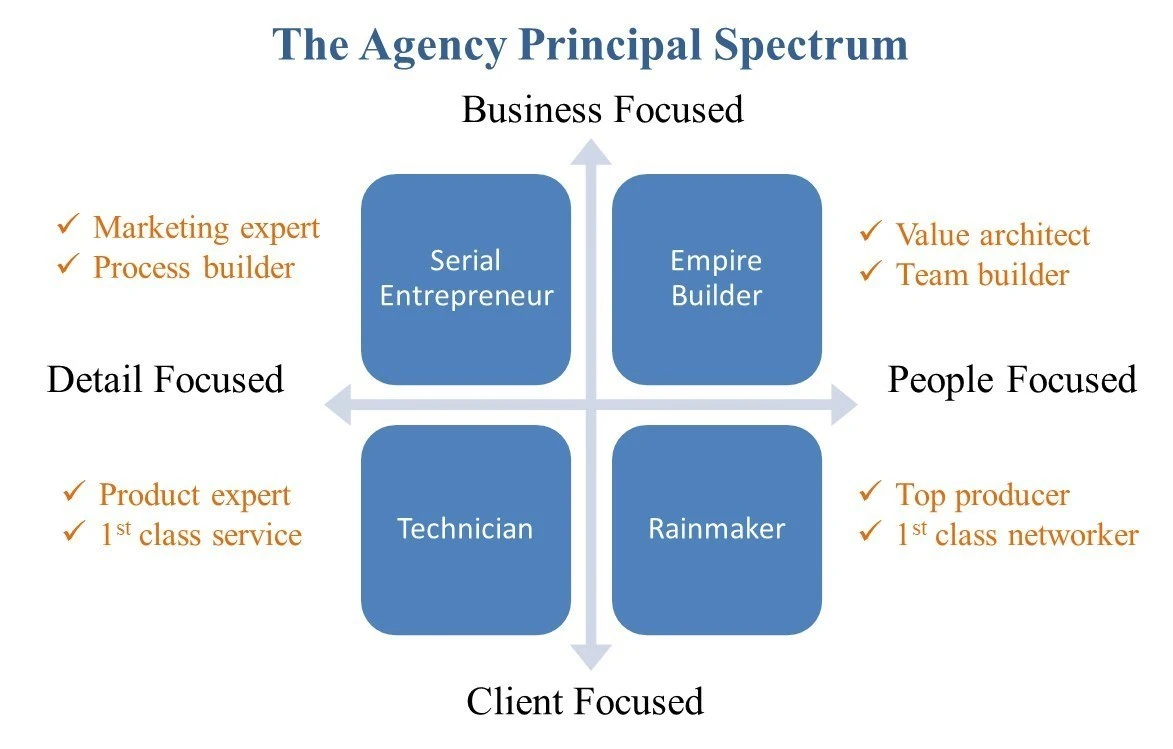
What kind of agency owner are you?
I have had the fortune of interacting with hundreds of business owners over the years. Going even back as far as my college days when I bartended at a yacht club, I’ve always tried to take note of successful people and dissect what it is about them that drives their success. If we ever get the chance to meet, you may find me to be reserved and quiet. It’s a trait adapted intentionally. Most people, particularly my clients that are of an older generation, like to be heard. The less I talk, the more I am inclined to listen and, by listening, learn. Due to the nature of my business, I have worked with individuals that own small agencies and those that run very large agencies with hundreds of employees.
While the personal attributes of successful agency owners vary, at their core, they all possess a strong passion. The passion may be for their profession, for people, for taking on a challenge, for building a legacy, for life outside of their business, or for a combination of these. As noted previously, the passion for highly successful people borderlines on obsession (if not completely an obsession).
In the discussion below, I try to articulate how these passions drive the type of agency owner you are and the attributes, strengths, and weaknesses that may follow. The intent is not to place anyone in a box, but to help self-identify who you are and, if you so desire, what you might need to overcome to take your agency to the next level.
4 Types of Insurance Agency Owners
Borrowing a little from Michael Gerber’s E-Myth and mixing in some speculation, I think there are basically four types of agency owners, as depicted in the chart below.

1. The Technician
The Technician is one that loves the details of the products or services that their business provides. They have a passion for the more technical and intellectual side of insurance, usually more so than their clients or peers, and like being thought of as an expert. The Technician is a dedicated professional and often provides first-class service to their customers. As business owners, their weakness is that they spend most of their time focused on technical details while often neglecting running the business, so the growth of the business is often limited because they have a hard time delegating. They can also be overly critical of peers, which may create employee turnover problems. When it comes time to exit the business, they struggle with letting go because their identity is wrapped up in what they do and because they don’t think someone else will do as good of a job servicing their customers.
2. The Rainmaker
The Rainmaker is one that loves the competitive nature of selling and building relationships. They are a great salesman (or woman) and networker and have an innate ability to generate new business and new connections. They possess talents and interpersonal skills that aren’t trainable, which frustrates them when managing others that are different. While they may be able to land large clients or develop unique referral partnerships, their weakness is in management. They’re energy is focused on sales, so they tend to neglect the management of the business and their people. Organizationally, they are often the key producer in the business with mostly support staff behind them to allow them to focus on sales activities. When it comes time to exit the business, they are hard to replace because of their personal connections and their unique personal abilities.
3. The Serial Entrepreneur
The Serial Entrepreneur is one that loves searching for opportunities and putting their business acumen to work scaling a business. I’m not referring to the generic term “entrepreneur” here. This is a person that seeks out opportunity and scales a business around it. The Serial Entrepreneur is an effective marketer and technician in implementing processes. They are confident, high-energy, risk-takers that learn best by trial and error. Due to an almost ADHD-type personality, they often build and sell multiple businesses or manage more than one at a time. The Serial Entrepreneur understands what creates value in a business and tends to view things from a mile high, which makes them more in tune with market changes and finding opportunities. Their weakness is that their passion is in new opportunities and when a better or more interesting one presents itself, then they are ready to move on. They also tend to micromanage, so their organizational structures are often flat, which eventually leads to the business hitting a ceiling. When it comes time to exit a business, the business barely skips a beat because they have it running like a well-oiled machine.
4. The Empire Builder
The Empire Builder is one that is passionate about creating a legacy, building significant wealth, and/or making a difference in the world. They are optimistic, big-picture people with a vision and superior powers of influence. Their energy is often focused on hiring the best talent, developing strategic partnerships and developing the company’s culture. They are in it for the long haul so they continually invest in the future. They surround themselves with strong managers that are better at overseeing the details so that they can focus on realizing their vision. The Empire Builder often starts as one of the other types (Technician, Rainmaker, Serial Entrepreneur) and grows into the role of building a large, high growth agency. The weakness of the Empire Builder, if any, is that they do not plan for their exit because they don’t want to leave.
Are there other types?
I realize that by trying to narrow this down to four categories I am leaving myself open for critique. I considered two other categories, namely a Lifestyler – a person that builds an agency to support a certain lifestyle and then scales back – and a Manager – a person effective at managing an agency with modest growth but no desire to pursue other ventures. Both of these are types that have the potential to be one of the four types, or once were, but their priorities and passions lie outside of business. The Lifestyler was often a Rainmaker but phased into semi-retirement. The Manager has the potential to be a Serial Entrepreneur, applying their skills to another venture, but chooses not to.
How to use this information
The traits that distinguish these classes from each other are on a gradient scale, as indicated by the x-y plot. For example, one Serial Entrepreneurs may be more people-focused than another (i.e. closer to the y-axis), but both are strongest in the areas of creating effective processes and watching KPIs. Since the spectrum is two-dimensional, principals often demonstrate characteristics of more than one of these classes. As time passes, people’s priorities can change and affect their management style. Furthermore, you may have the ability to change your style if your desire to grow the business is strong enough – although overcoming inherent weaknesses is very difficult!
There is another solution. Someone once wisely told me that every successful business has an inside guy and an outside guy (or gal), meaning that there is one person who drives business in the door (i.e. handles sales and marketing) and another that makes sure the business is taken care of (i.e. implements procedures and manages HR and accounting). The reason it takes two (or more) people is that the traits of the “inside guy” and the “outside guy” are opposing personalities. As you grow your business, the most probable solution is to either hire people with strengths that you lack, such as in management or bring on business partners whose strengths and weaknesses balance with yours. Take care to make sure that any potential business partner will add significant value to the company. If you simply need someone to do a job, then you are better off hiring someone.
This is a short discussion but should be thought-provoking since it applies to nearly everyone that will take the time to read this. Feel free to add your comments below or reach out to me with your perspective.
Experts in Insurance Distribution Business Valuation, Sale, and Acquisition
We deliver superior results through our industry expertise, transaction expertise, and professional network.
Contact us



